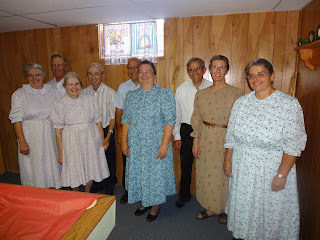Our family got together yesterday for Family Day. Our pattern has been to alternate between going to the cabin for a weekend one year and doing a one-day sightseeing trip the next year. There have been a few variations along the way but this was the year to do a day trip. Several years ago we planned to go to Valley Forge and were rained out. It's only about 80 minutes from here and a place I always wanted to see but never had. I still wanted to go there, so that was our chosen destination for yesterday. And this time the weather cooperated beautifully.
We got CDs to play in our vehicles as we took a self-guided tour of the Valley Forge National Park. It was much cheaper than the trolley and we followed the same route. The CD helped us know what we were seeing so we could try to visualize what it was like to live there in the winter of 1777.
George Washington's army of 12,000 lived in 2000 log huts they built in the freezing weather. Although the original huts disappeared long ago, some replicas have been erected in scattered locations around the park. They were crude but at least provided a roof over their heads. As many as twelve men lived in these small huts.
George Washington lived in a tent until the men were housed in log cabins and then rented this house where he wintered with his wife and other officers. People came and went constantly but sometimes as many as twenty people were living here, eating and sleeping wherever they could find a space.
General Varnum lived in this house. It was built in the 1720s and is the oldest structure in the park.
The men who spent the winter at Valley Forge suffered from hunger, cold, and disease which resulted in about 3,000 deaths. Lack of food and proper sanitation resulted in many deaths from starvation, pneumonia, typhus, and dysentery. Those with contagious diseases were moved to hospitals off the premises. One of these was in the Ephrata Cloister.
The youngest member of the family was not impressed with his historical surroundings and slept through some of it.
After we finished the tour we came back here for a cookout and evening of visiting and reminiscing. The homemade ice cream and burgers were delicious.
The Revolutionary War is a part of our history and changed the course of our nation but, contrary to what is taught in the history books, it was not supported by the majority of Americans. It was a war brought on by the aristocrats seeking to protect their interests. The majority of the common people would have been satisfied to remain under English rule. Most of the soldiers were not fighting for the great cause of freedom from oppression but joined the army for personal benefits---the promise of good pay, a way to reduce the seven years of indentured service required to pay for their passage to America, etc. The Hessians (Germans) were hired and imported specifically to fight for the British.
The Mennonites found themselves in a difficult position during the Revolutionary War. Their historic doctrine of nonresistance prohibited them from joining the army. But refusal to do so branded them as Tories. They believed it was their duty to obey and pay taxes to the government but the Revolution was rebellion to authority. Additionally, when they immigrated they promised to be loyal to the king who was the authority at the time. Now they were suddenly being told they need to break that promise and be loyal to a rebel government. They could not conscientiously do this. They were caught in the struggle between the two sides. They wanted to obey the government but were unable to tell which side would win and therefore did not know who was their "Ceasar."
The Mennonites provided humanitarian aid to soldiers on both sides of the conflict. They provided food, blankets, and supplies to the hungry and naked men in Washington's army and helped to nurse the sick who were taken to the Ephrata Cloister. But they also provided lodging and food for British prisoners of war and helped them return to their units in Philadelphia and New York. For these actions, some Mennonites were jailed and some were taxed into bankruptcy.
For a better understanding of the political situation at the time of the Revolutionary War, I recommend you read David Bearcot's book, In God We Don't Trust. This book peels away the layers of myth that have been wrapped around the Revolutionary War and exposes the truth of the situation. While it may have been God's plan for the United States of America to become an independent nation, the same results could have been achieved without fighting a war that cost 50,000 lives. Other nations that were in the British Empire and gained independence did so by negotiations. America could have done the same but (to put it simply) went ballistic over a three-cent tax on tea that resulted in a lot of blood being shed unnecessarily.








